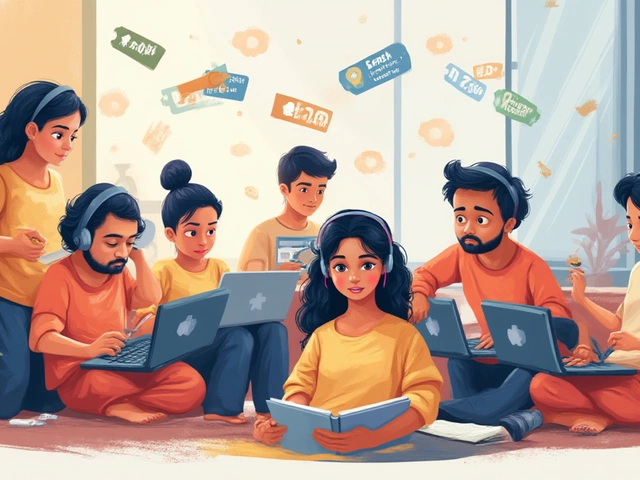
Learning English for free sounds kind of magical, doesn’t it? Especially with all the options floating around—websites, apps, YouTube, and Zoom classes. I’ve seen friends and family go from silent nods to confidently ordering in restaurants, thanks to these free resources. The right program doesn’t just throw endless grammar rules at you; it gets you speaking, thinking, and laughing in English. There’s no one-size-fits-all, but some tools stand out for real results. With so many promising English programs, digging through the noise to find the one that actually works can feel like a treasure hunt. Let’s cut through the clutter and zero in on what makes a free English program not just good, but genuinely life-changing.
What Makes a Good Free English Learning Program?
The first thing to realize is that not all programs are built the same. You want more than just a dictionary and a boring quiz. People learn best when the program has a few solid ingredients: interactivity (so you’re not just reading alone), speaking practice (so your mouth isn’t a stranger to English sounds), regular feedback (because otherwise, how do you know if you’re saying "beach" or, well, the other word?), and a mix of real-world conversations and some grammar tossed in. If you find a program that combines all that and still keeps things fun, you’re already ahead of the game.
For example, apps that use speech recognition might help you tweak your accent. Platforms that connect you to learners from other countries show you how people actually use English in conversations, not in stuffy textbooks. Even better, some have AI tutors that never get tired of drilling vocabulary with you. The real game-changer is when a program lets you actually use English in a safe, judgment-free space—kind of like how kids pick up a new language just by playing. When Gemma started learning, she picked an app that threw her into silly conversations about buying imaginary ice cream. Guess what? She still remembers those phrases years later.
And here’s a tip: don’t be fooled by programs that claim you’ll speak fluently in 30 days. Quality free programs focus on steady, bit-by-bit improvement and let you practice every day. You want something that adapts to your level. A 2022 study by the British Council found that learners who used adaptive language apps for 15 minutes daily improved their speaking skills twice as fast as those using static grammar-only sites. Table time—check out these features that make or break free English learning programs:
| Feature | Why It Matters |
|---|---|
| Speaking Practice | Builds real confidence and muscle memory |
| Interactive Lessons | Keeps you engaged; makes learning fun |
| Community Support | Motivates and offers help when you’re stuck |
| Feedback & Correction | Tells you what you need to fix |
| Accessible on Phone & Computer | Lets you learn anywhere—bus stops, cafes, bed |
The Top Free Programs to Learn English in 2025
If you talk to anyone who’s learning English, three names usually pop up: Duolingo, BBC Learning English, and Busuu. But that’s just the start. Here’s the secret sauce behind the best free options this year:
- Duolingo: This little green owl has everyone hooked. Why? The gamified lessons keep you coming back for more. You get instant feedback, and there’s a speaking component that actually works decently. In early 2025, Duolingo updated its speaking exercises, and the number of daily active users jumped by 19% within two months. Sure, it sometimes feels like you’re translating weird sentences, but repetition works. And it’s always free.
- BBC Learning English: Want to sound like an actual human? BBC’s videos, podcasts, and interactive exercises offer real news clips, drama series, and pronunciation tools. They use bite-sized lessons. Fun fact: The BBC Learning English YouTube channel crossed 6 million subscribers last month, showing just how popular it is worldwide.
- Busuu: You get a social network of learners and native speakers who help check your exercises. The app is very structured, following the European CEFR levels (A1 to C2), so you know exactly where you stand. After introducing daily review reminders in late 2024, Busuu reported that beginners completed 38% more courses through the free program.
- British Council LearnEnglish: The gold standard for more formal English. Loads of interactive material: grammar explanations, listening practice, and games. The new "LearnEnglish Podcast" series delivers real-life stories with transcripts, which is huge for building listening skills.
- Memrise: This app turns vocabulary building into a memory game. It features thousands of user-recorded videos by native speakers, so you can see and hear real accents. Memrise has been shown to improve vocabulary recall by 44% compared with simple flashcard apps, according to a 2023 European EdTech report.
Special mention goes to platforms like HelloTalk, which connect you with other learners for texting and voice notes. You help someone with your language, and they help you practice English. No textbook can recreate the weirdness and joy of actual chatty conversations.
Everything above is free at the basic level. Some have paid extras, but don’t worry about those—you can do a lot without paying a cent. The key is picking a program that suits your personality. If you’re competitive, maybe Duolingo’s streaks motivate you. If you love stories and news, BBC Learning English rocks.

Hidden Gems: Lesser-Known English Learning Tools
It’s easy to stick to the famous names, but there’s a whole world of underrated tools that get zero attention in big reviews. Take "ESL Fast," for example. It offers more than 3,500 easy conversations with audio. Or “VOA Learning English”—Voice of America’s program—for slow, clear news articles and stories that build listening skills without overwhelming you with fast speech. Their stories are written at a lower vocabulary level, perfect for beginners who want something more engaging than kids’ cartoons.
Want to practice listening and speaking at the same time? “ELLLO” (English Listening Lesson Library Online) has over 3,000 audio and video conversations from speakers around the world. You get used to different accents, which matters if you plan to use English in real life. And for people who love quizzes and competition, "Kahoot!" is a free quiz platform with tons of public English quizzes. I once played a grammar Kahoot with my nephews and ended up learning a thing or two myself.
If you’re into podcasts, “Luke’s English Podcast” is a quirky way to pick up slang, jokes, and the stuff nobody teaches in class. There’s also "Simple English Videos" on YouTube, where dialogues are acted out in funny, everyday scenarios. It turns out—watching someone argue about washing dishes is surprisingly useful for learning real English.
Don’t forget the power of open online courses. "FutureLearn" unlocks short courses run by university professors, all free at entry level. "Coursera" and "edX" let you audit top-rated English courses for nothing but your time. Data from FutureLearn’s 2024 annual report showed that independent learners spent an average of 43 minutes per day on English skills—the highest among their language offerings.
Here’s a quick rundown of hidden gems worth checking:
- ESL Fast: Bite-sized dialogues for real conversation.
- VOA Learning English: News and stories for beginners.
- ELLLO: Global audio and video lessons.
- Kahoot!: Quizzes for fun competition.
- FutureLearn: University-taught courses for free.
You never know which tool will click for you, so give a few a try. Maybe your perfect program isn’t famous—it just works for your brain.
Real-Life Tips for Making the Most Out of Free English Programs
Here’s where a lot of learners hit the wall: starting strong, losing motivation, and forgetting half of what they “learned.” Trust me, Gemma’s tried everything from sticky notes on the bathroom mirror to shadowing movie characters. Some hacks work, some just make you giggle. But habits are game-changers:
- Mix it up: Don’t just stick to one app or method. Alternate between listening, speaking, reading, and writing. Your brain gets less bored and remembers more.
- Set micro-goals: Trying to "learn English" is massive. Break it down—master five new words a day, complete two short conversations, or mimic a 30-second news clip.
- Speak out loud: This feels weird at first, but hearing your own voice saying English words cements them in memory. Even if it’s just reading cereal boxes or naming things you see.
- Find a buddy: Use forums in these programs to talk to others. HelloTalk or Busuu’s community features are especially good for grabbing practice partners. Even a ten-minute chat a week builds confidence fast.
- Make mistakes: Seriously, get comfortable with sounding silly. Every fluent speaker has cringed at something they said. You won’t remember what you got right, but you’ll never forget (and will correct!) your mistakes.
- Create rituals: Link your English time to a daily habit— right after brushing your teeth, during lunch, or on the bus. Consistency beats cramming every time.
- Gamify it: Reward yourself for streaks, just like Duolingo, but make it real—a chocolate for every five-day streak or a movie night for completing a tricky lesson.
Data shows that learners who practice English in short, regular sessions (10-20 minutes a day) retain 60% more vocabulary than those who cram once a week. The trick isn’t having the fanciest tech. It’s showing up, every day, even just for a few minutes. Your brain is wired to learn in small, enjoyable bursts. If the program you chose bores you, ditch it. Find what makes you smile or fires you up.

So, What Is the Best Free Program to Learn English?
Here’s the answer that makes some people roll their eyes: the best free program to learn English is the one you actually use, every day—and stick with for months, not just a week. Duolingo wins for pure engagement and fun, but if you want to understand real accents and conversation, bring in BBC Learning English, Memrise, or even a hidden gem like ELLLO or VOA Learning English. Mix and match. Try different things: podcasts on a walk, quick quizzes on lunch break, voice chats once a week. Don’t underestimate how powerful community and regular feedback can be. Remember, you don’t pay with money—you pay with your time and attention, so invest wisely.
Honestly, my friends who became conversational didn’t use just one program. They built their own "English world" using several free resources. Gemma’s hack was to use Duolingo on the bus, then watch BBC Learning English while cooking, and ask questions on Reddit’s EnglishLearning forum at night. You can do the same, mixing whatever fits your day and keeps you moving forward. Get creative and figure out what makes English stick in your mind. Get out there and try a few of these programs. You might even surprise yourself.





